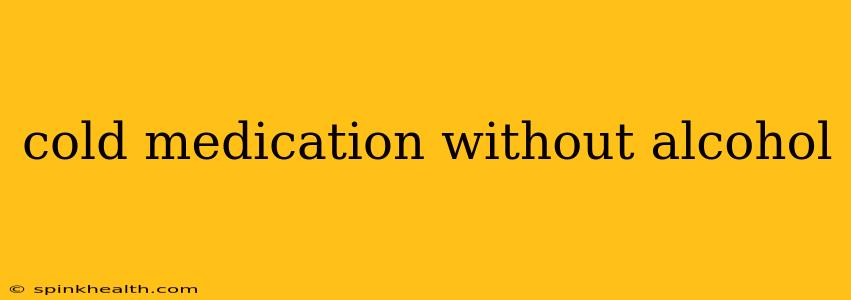Ah, the dreaded cold. That scratchy throat, the runny nose, the body aches… It’s enough to make anyone want to curl up and disappear. But reaching for relief shouldn't mean compromising your health further. Many over-the-counter cold medications contain alcohol, a fact that can be overlooked amidst sniffles and sneezes. This article explores the world of alcohol-free cold remedies, addressing common questions and helping you navigate your way to feeling better, responsibly.
What are the common cold symptoms?
Before we dive into remedies, let's quickly refresh what constitutes a common cold. Symptoms can vary from person to person, but typically include a runny or stuffy nose, sore throat, cough (often initially dry, then becoming productive), sneezing, headache, muscle aches, and sometimes a mild fever. Knowing these common symptoms helps you identify the specific relief you need.
What cold medications don't contain alcohol?
The good news is, many effective cold medications are entirely alcohol-free. Look for formulations that explicitly state "alcohol-free" on the label. Many brands offer a wide range of products, including decongestants (to relieve stuffiness), expectorants (to loosen mucus), pain relievers (for aches and fever), and cough suppressants. Always read the label carefully to ensure it aligns with your needs and any potential allergies or interactions with other medications.
Are there any natural remedies for cold symptoms without alcohol?
Beyond over-the-counter medications, several natural remedies can provide relief without alcohol. These include:
- Rest: This is crucial! Your body needs time to fight off the infection.
- Hydration: Drink plenty of fluids, like water, clear broths, and herbal teas, to thin mucus and prevent dehydration.
- Humidifier: Adding moisture to the air can soothe a dry throat and ease congestion.
- Saline nasal spray: This can help clear nasal passages.
- Gargling with salt water: This can ease a sore throat.
- Over-the-counter throat lozenges: Many are alcohol-free and provide soothing relief.
What are the side effects of alcohol in cold medications?
While some older formulations included alcohol as a solvent or preservative, it's not a necessary ingredient in modern cold medications. However, consuming alcohol while taking certain cold medications can lead to unwanted interactions, potentially increasing drowsiness or other side effects. Alcohol can also dehydrate you, counteracting the benefits of increased fluid intake for cold symptom relief.
Can I take cold medicine with alcohol?
This is a crucial question, and the answer is generally: no, you shouldn't. Mixing cold medication with alcohol can increase the risk of side effects such as drowsiness, dizziness, and slowed reaction time. It can also potentially increase the risk of liver damage, especially with prolonged or excessive use. Always follow the instructions on the medication label and consult a doctor or pharmacist if you have any questions or concerns about medication interactions.
How do I choose the right alcohol-free cold medication?
Choosing the right cold medicine is a matter of understanding your specific symptoms. If you have a stuffy nose, a decongestant might be helpful. If you have a productive cough, an expectorant could help. Pain relievers can address aches and fever. Always read the label carefully, paying attention to the active ingredients and any potential interactions. If you're unsure, consult a pharmacist or doctor who can recommend the best option for your individual needs.
What should I do if my cold symptoms worsen or persist?
If your cold symptoms worsen, persist for more than 10 days, or are accompanied by a high fever, severe headache, shortness of breath, or other concerning symptoms, seek medical attention immediately. These could indicate a more serious condition requiring professional care.
Remember, choosing alcohol-free cold medication is a simple way to prioritize your health and well-being while managing cold symptoms. Prioritizing rest, hydration, and understanding your symptoms is just as important as choosing the right medication. Stay healthy, and remember to always read labels and consult a healthcare professional when needed!

